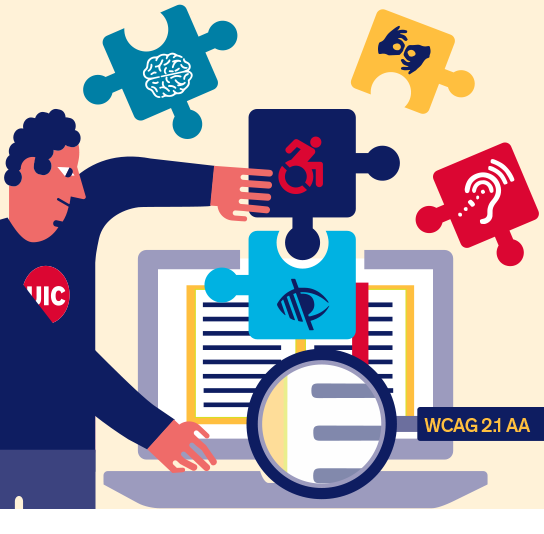Embracing Accessibility: An Inside Look at the New Federal Accessibility Mandate
Quote
“This legal rule creates a timeline for public government entities (including public universities) to meet Web Content Accessibility Guidelines (WCAG) Level 2.1, AA. These standards are designed so that tenets of universal accessibility are considered and built-in from the beginning, rather than tacked on after a user runs into access barriers.”
text

Public institutions like UIC are at the forefront of a major shift toward digital accessibility. By April 2026, UIC must comply with the new Web Content Accessibility Guidelines (WCAG) Level 2.1, AA standards, which set a proactive approach to accessibility that integrates accessibility from the start rather than adding accommodations after barriers are encountered. “The biggest learning curve will be right at the beginning,” Sophia Hamilton, Director of the Disability Resource Center (DRC), explained, but new digital accessibility tools are continually improving and will simplify the process over time.
To meet this ambitious goal, UIC’s accessibility champions, Sophia Hamilton (DRC Director), Peter Berg (University ADA Coordinator), and Jemma Ku (Director of IT Accessibility for Technology Solutions and co-chair of the Digital Accessibility Steering Committee, are leading a campus-wide effort to bring UIC into full compliance. They share insights on what this means for our faculty, students, and institutional practices. But first, who exactly are these incredible figures working behind the scenes to help UIC achieve a new standard of digital accessibility?
Meet the UIC Accessibility Champions
Sophia, the DRC Director since 2018, brings a wealth of experience from her previous role at Kennedy-King College. Peter, our University ADA Coordinator since 2022, combines a personal and professional passion for accessibility “as someone who uses assistive technology and benefits directly from accessible design” while improving access for others across the university. Jemma, who joined UIC in 2020, leverages her web application development and user experience design background to drive accessibility initiatives. Jemma shares, “The passion to provide universal access to everyone led me to this field. As a former web application developer, user experience designer, and librarian for the last 15 years at UIUC, I bring accessibility services and engineering expertise to the position.”
text2

For Sophia, Peter, and Jemma, the most rewarding aspect of their work is seeing the positive impact of accessibility on students’ lives. Sophia shares, “We know that having qualified practitioners with diverse perspectives benefits any discipline. It is rewarding to know that our disabled graduates are enriching their fields, not only with their excellent UIC-fostered content area expertise, but also with their lived experiences and knowledge.” Peter adds, “It is gratifying to work to make sure that all programs, services, and activities of the University and UI Health are accessible to and usable by all students, staff, faculty, patients, and visitors with disabilities.” Jemma finds it most rewarding “when people recognize the importance of providing equally effective access to digital assets, regardless of whether they have a disability.”
Understanding the New Accessibility Law
The new law mandates that public entities, including universities, comply with Web Content Accessibility Guidelines (WCAG) 2.1, AA level, by April 2026. Sophia explains, “This legal rule creates a timeline for public government entities (including public universities) to meet Web Content Accessibility Guidelines (WCAG) Level 2.1, AA. These standards are designed so that tenets of universal accessibility are considered and built-in from the beginning, rather than tacked on after a user runs into access barriers.”
To guide UIC through this transition, the Digital Accessibility Steering Committee (DASC) has developed an ADA roadmap that involves multiple departments and stakeholders. Jemma co-chairs this committee with Caryn Bills, Associate Chancellor of the Office of Access and Equity. Sophia emphasized that accessibility is everyone’s responsibility, not just an IT-related issue. Peter stresses the importance of an institution-wide commitment. “Success depends on dedication from everyone, adequate time, and the right resources,” he says. “Compliance isn’t just a checklist—it’s about creating an inclusive campus where everyone has equal access.”
The Stakes of Non-Compliance
Non-compliance with these standards can have profound consequences. Peter highlights, “The University and UI Health are subject to enforcement by multiple federal agencies. Responding to and defending a complaint or lawsuit is costly, both financially and to the reputation of the University and UI Health.
Just as real as the legal obligation, Peter clarifies, is the “moral and ethical obligation to comply. Accessible content benefits everyone and leaves no one behind in accessing educational opportunities.”
Supporting Our Students
Currently, students with disabilities must request accessible materials through the Disability Resource Center (DRC). However, by April 2026, all materials must be accessible upon receipt. Sophia notes, “In our current state, students with disabilities must register with the DRC and request that any inaccessible materials be converted to a more accessible format. This support from DRC will always be available, but the new DOJ rule specifies that materials must be accessible upon receipt by the class.”
LTS plays a key role in UIC’s transition to the new standards. The student specialists and staff provide a frontline for faculty and students to engage with various learning technologies and receive learning support, working with units such as CATE or IDMPS.
Challenges and Changes Ahead
Achieving full compliance by 2026 will require a collective effort from the entire UIC community. All three team members emphasized the importance of collective commitment from the UIC community. Jemma summarized that “commitment by everyone including the passion for universal access” and “concerted efforts at every level” will be a determining factor in UIC’s successful transition.” Sophia added in a hopeful tone, “One major asset UIC has working in our favor is a faculty who are genuinely committed to accessibility and inclusion. Many universities will be mired in internal battles about this mandate with faculty who feel unmoved by the imperative. In my experience, people come to teach at UIC because they believe in our mission, and they want to serve our community. We have the will – we just need to make sure everybody knows the way!”
A group of accessibility advocates has launched an accessibility website dedicated to helping educators, designers, and organizations create more inclusive digital spaces. The site offers resources, tools, and best practices aligned with WCAG 2.1 standards. Visit the site today to learn how to make your content accessible for all and join a growing community committed to inclusivity. Stay tuned for a campus-wide announcement in early Spring about improving the accessibility of your course through a Spring mini-challenge for all users with a Blackboard course.